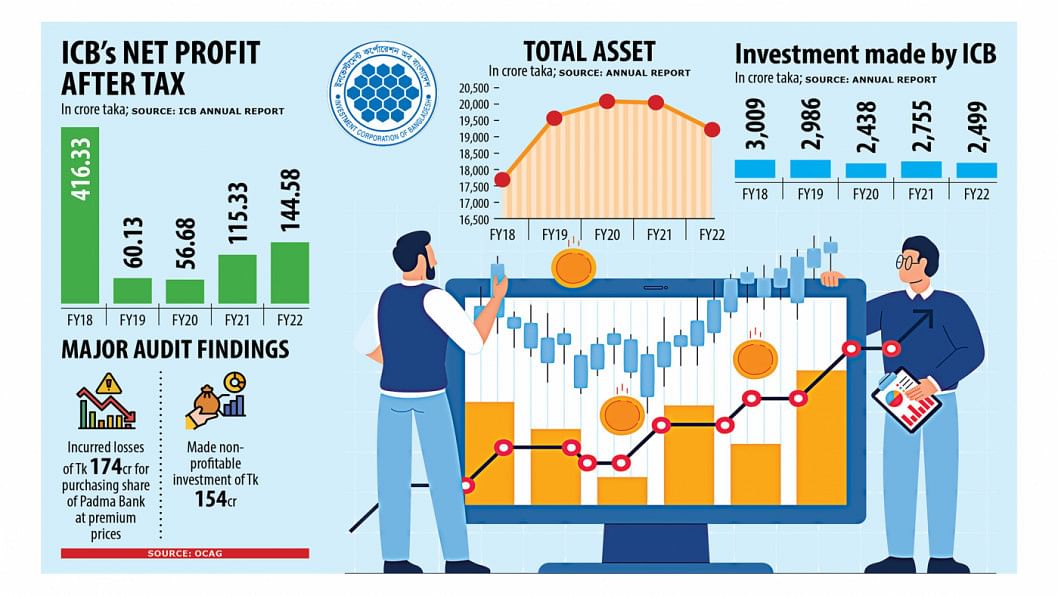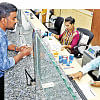ICB could lose Tk 438cr for unusual investment decisions

Unusual investment decisions made by the state-run Investment Corporation of Bangladesh (ICB) could inflict a loss of Tk 438 crore on taxpayers as the funds have either turned into default loans or remained largely unrealised, according to an audit report.
For example, abnormal investments in ailing Padma Bank Ltd caused ICB a loss of Tk 174 crore, the Office of the Comptroller and Auditor General (OCAG) found.
The supreme audit institution of the country carried out the audit on ICB's activities for the financial years of 2015-16 to 2017-18.
The audit report showed ICB made an equity investment in Padma Bank Ltd after it bought shares at Tk 13.33 each against a face value of Tk 10. The total investment was Tk 60 crore.
It also opened a fixed-deposit worth Tk 197.18 crore with the bank. After the maturity, some of the funds were returned and ICB still has unrealised deposits of Tk 114 crore and interest of Tk 6.86 crore.
The equity investment of Tk 60 crore is yet to be tradable as the bank has not gone public yet.
The investment approval letter of ICB included a condition that the bank would be listed on the stock markets within three years of starting activities. So, ICB's Tk 174 crore is at risk considering the weak financial health of the bank, according to the OCAG.
ICB has also invested in some other companies but some of the investment decisions were not normal and a proper analysis-based. So, funds worth Tk 264 crore were going to be lost, according to the OCAG.
It said opening the FDR involving a huge amount of money with the new bank has been abnormal.
"It was not a right decision to keep such funds in the bank even after knowing the weak financial health of the bank."
ICB has injected funds into Best Holdings, the owning company of Le Méridien Dhaka hotel, through the purchases of convertible secured bonds of Tk 150 crore in 2018.
According to the ICB's project assessment committee, the loan repayment capacity of Best Holdings was not at a satisfactory level and the investment was not profitable considering ICB's cost of funds.
The bond matured in 2020 but the fund is yet to be realised along with the interest income of Tk 4 crore, the audit report said.
Another example of ICB's wrong investment decisions was the purchase of debentures of Global Jute Industries worth Tk 25 crore in 2013. A debenture is a type of long-term business debt not secured by any collateral.
As the fund was not repaid by the jute company, ICB has rescheduled it.
Currently, the fund has turned into a defaulted loan of Tk 39 crore and the borrower is not communicating with ICB in response to queries from the lender.
The borrower also did not present the main documents of the mortgaged asset, so there is a suspicion whether there is any mortgaged asset, the audit report said.
Set up in 1976, ICB supports the stock markets in Bangladesh.
In 2017-18, ICB's profit was Tk 416 crore. It plummeted 65 per cent to Tk 144 crore in the last financial year, according to the annual report.
It invested Tk 3,009 crore in 2017-18 and it dropped to Tk 2,499 crore in the last financial year, which ended in June.
ICB's return on investment, an important performance indicator, dropped to 2.46 per cent in FY22, way down from 10.72 per cent in 2017-18.
The bad investment decisions of ICB deteriorated its profitability and effectiveness in the stock market, said a top official of a merchant banker.
"The government should investigate to identify the persons involved in such investment decisions and whether they had any bad intentions."
In another bad investment decision, Shonaichhori Agro Firms in Bhola took a loan of Tk 91 lakh from ICB for a project. But in reality, no such project was there.
The project is not feasible as the site is not secure. So, the allotted fund was spent elsewhere, the auditor said.
The investment bank invested Tk 1.23 crore in a fictitious project named Deep Ocean Bioplant. After a visit by the ICB's recovery department, it said such a fish farming project could not be found in its registered place.
"The documents used as a collateral were also fake. If ICB had visited the project site before disbursing the funds, the funds would not have been allocated," the auditor said.
ICB also absorbed financial losses of Tk 5 crore for the overvaluation of land and inflating the price of a transformer that Dhanshiri Auto Rice Mills has bought.
It suffered financial losses of Tk 5.57 crore by lending to Pacific Footwear Industries although the company had already secured loans beyond regulatory limit. The purchase of debentures of the firm was not right and it ultimately became unrealised, the OCAG said.
ICB also failed to recoup the investments it extended from the Equity and Entrepreneurship Fund (EEF) of the central bank to Adhunik Hatchery & Fisheries as the project had been abandoned.
Among its other EEF-backed investments, ICB has unrealised funds of more than Tk 57 crore in four projects.
"ICB invested in the equity of Farmers Bank hoping its performance would be better and provide good dividends. However, the performance was not up to the mark," said Abul Hossain, managing director of ICB.
In January 2019, Farmers Bank was renamed Padma Bank as the troubled lender looked to sweep the gross irregularities and loan scams under the carpet and get an image makeover.
About the FDR in Farmers Bank, Hossain said it keeps FDR in many banks. "Maybe, the officials at the time had believed in its potential."
In the last two years, the bank has started to return the interest on the FDR slightly.
Best Holdings has sought some time to repay since it will get funds from its initial public offering soon. So, ICB has extended the repayment period to 2024, he said.
On the EEF fund, Hossain said the policy of the fund involves some problems. Entrepreneurs will get profits but they will not participate in any loss. So, the fund is hit sometimes when the project incurs losses.
The fund has been launched by the government to encourage new entrepreneurs. Bangladesh Bank is its agent and ICB is the sub-agent.
"The main problem was found to be in the last instalment. Now, we are working on the recovery of EEF with the help of the Bangladesh Bank," Hossain said.
The official added ICB has branches at the divisional level alone so it is tough to monitor union-level investments.


 For all latest news, follow The Daily Star's Google News channel.
For all latest news, follow The Daily Star's Google News channel. 








Comments